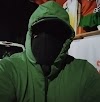Major Somnath Sharma, PVC (31 January 1923 – 3 November 1947), an Indian Army officer, was the first recipient of Param Vir Chakra (PVC), India's highest military decoration.
In 1942, Sharma was commissioned into the 8th Battalion, 19th Hyderabad Regiment. He served in Burma during the Arakan Campaign of World War II, for which he was mentioned in despatches. He later fought in the Indo-Pakistani War of 1947. Sharma was killed on 3 November 1947 while evicting Pakistani infiltrators from Srinagar Airport, and was posthumously awarded the Param Vir Chakra for his actions prior to his death.
Early life
Sharma was born on 31 January 1923 at Dadh, Kangra, then in the Punjab Province of British India, the present day state of Himachal Pradesh. His father, Amar Nath Sharma, was a military officer. Several of his siblings served in the military.
Sharma completed his schooling at Sherwood College, Nainital, before enrolling at the Prince of Wales Royal Military College in Dehradun. He later studied at the Royal Military College, Sandhurst. During his childhood, Somnath was influenced by the teachings of Krishna and Arjuna in the Bhagavad Gita, taught to him by his grandfather.
Military career
On 22 February 1942, upon his graduation from the Royal Military College, Sharma was commissioned into the 8th Battalion, 19th Hyderabad Regiment, of the British Indian Army (later to become the Indian Army's 4th Battalion, Kumaon Regiment). During World War II, he saw action against the Japanese in Burma during the Arakan Campaign. At that time he served under the command of Colonel K. S. Thimmayya, who would later rise to the rank of general and become Chief of the Army Staff from 1957 to 1961. Sharma was mentioned in despatches for his actions during the fighting of the Arakan Campaign.
Throughout his military career, Sharma was greatly influenced by his uncle Captain K. D. Vasudeva's gallantry in action. Vasudeva also served with the 8th Battalion, participating in the Malayan Campaign during which he died aiding hundreds of soldiers under his command to survive from the Japanese offensive.
Battle of Badgam
Indo-Pakistani War of 1947
On 27 October 1947, a batch of troops of the Indian Army was deployed in response to the invasion by Pakistan on 22 October into the Kashmir Valley, which is a part of India. On 31 October, D Company of 4th Battalion of Kumaon Regiment, under the command of Sharma, was airlifted to Srinagar. During this time, his left hand was in a plaster cast as a result of injuries sustained previously on the hockey field, but he insisted on being with his company in combat and was subsequently given permission to go.
On 3 November, a batch of three companies was deployed to the Badgam area on patrol duties. Their objective was to check the infiltrators moving toward Srinagar from the north. As there was no enemy movement, two of the three deployed companies returned to Srinagar at 2:00 pm. However, Sharma's D Company, was ordered to stay in position until 3:00 pm. At 2:35 pm, Sharma's company was fired upon from the local resident houses in Badgam but counter-fire was not ordered to avoid injuring or killing innocent civilians. Suddenly, a tribal lashkar (English: militiamen) of 700 infiltrators approached Badgam from the direction of Gulmarg. D Company was soon surrounded from three sides and sustained heavy casualties from mortar fire. Sharma realized the importance of holding onto his position as both the city of Srinagar and the airport would be vulnerable if lost. Under heavy fire, and outnumbered by a ratio of seven to one, he urged his company to fight bravely, often exposing himself to the enemy fire as he ran from one post to the other.
When heavy casualties adversely affected the company's firing power, Sharma took upon himself the task of distributing ammunition to his men, operating light machine guns. While busy fighting the infiltrators, a mortar shell exploded on a pile of ammunition near him. Before he succumbed to his injuries, he transmitted a message to his brigade's headquarters which read:
"The enemies are only 50 yards from us. We are heavily outnumbered. We are under devastating fire. I shall not withdraw an inch but will fight to our last man and our last round."
— Major Somanth Sharma, Battle of Badgam, 1947



0 Comments